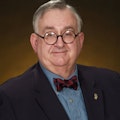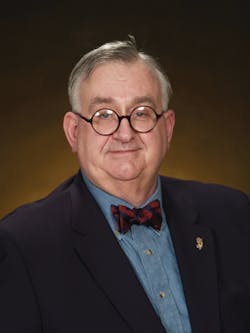Command Post: Riding the Right-Front Seat: You Must Be a Student
The time has come to share an important educational principle with you: Knowledge does not float freely through the air in the world around you. You cannot take a deep breath and inhale a whole bunch of information. You do not gain knowledge via osmosis. Simply holding a book firmly in your hands will serve not purpose in the gathering of new facts, figures and operational principles.
No, there is no way that knowledge will pop up within the inner areas of your brain by the simple act of wishing. No, you must consciously seek out new data and then actually do something to make it stick within your brain in such as way as to let you recall it when you need it.
subhead
Sadly, I know lots of people who are book smart, but operational dumb. I recall one buddy who had two conflicting knowledge-related attributes:
• Photographic memory for information
• Inability to use that knowledge efficiently during an emergency
This was not a great thing to see at work. That man knew what to do; he just could not make it work under pressure.
When you plunk yourself down in the right-front seat, you assume a great deal of power, authority and responsibility. Your people expect you to keep them safe and your fire department expects you to do all within your power to get the job done. Although some do not think that is a tough job, leading people in pitched battle, under emergency conditions, is not a simple task. Or, as I have said time and again, “Relax, gang, this is only a life-or-death job.”
For this reason, you must become a student of fire protection. After nearly five decades in the fire service, it is my sad duty to inform you that you will never know all that you need to know and that if you fail to develop an ongoing affection for learning more about your duties, you risk becoming a danger to the people whose lives have been entrusted to you.
The need to study became apparent to me early in my career. The only way to advance in rank was to study the professional literature and then sit for civil service promotional examinations. Since these tests came about only every three or four years, it was critical not to waste any opportunity. In those days, one of the great compliments you could have applied to you was to be deemed a “student” by your peers. Far too many people picked up a book only when promotional tests were announced, too late for them to absorb, assess and assimilate the necessary knowledge in a useful way. Students were those of us who always had our noses in the books, studying simply for what they could learn.
It has often been my thought that those of us who did a great deal of reading in those days gained an advantage that went far beyond the artificial realm of civil service testing. We acquired great quantities of knowledge that was available for use when we needed it on the fireground. Think of this process as a sort of internal PowerPoint program installed in your brain. How can you use this knowledge to help you perform your duties? It’s simple. As you and your crew roll into an emergency scenario, compare the scene in front of your eyes with the PowerPoint images in your onboard thinking computer. Your ability to have a wide range of PowerPoint images available for instantaneous review will improve your chances of success and reduce the potential for serious mistakes that could result in injuries or worse. Unfortunately, my plan for using stored knowledge will not work for those who fail to become students of our field. No knowledge equals no images in the memory bank.
Are you aware of just how quickly things are changing? If you stopped learning about building construction before 1999, return to the books and reboot your database. Newer buildings can fall on you during even a moderate windstorm. Forget fire damage; it is a marvel that more of these buildings are not simply collapsing under the weight of a heavy rain. If you are still thinking the old way, you are a danger to your team. Similarly, if your knowledge of smoke and its dangers isn’t up to date, the latest studies are truly eye-opening. Let me suggest to you that the impact of the effects of cancer and lung damage on you and your team are truly staggering.
Let me also point out to the newer right-front-seat leaders among us that you were not born with a built-in knowledge of fire and emergency service operations. What you learned during your recruit training and your periodic fire department drills just begins to scratch the surface of what you need to know. Select a relevant array of fire service leadership and operational texts to begin building your personal library. Supplement these sources with the fire service trade publications and attend classes and conferences to see what is going on in the here and now. You also have something available to you that did not exist during most of my fire service career: the Internet. Search the available literature to see what you can learn.
Share what you learn
Am I a student of the fire service? I think so. Otherwise, I would not feel justified to suggest that you join me in my search for knowledge. On the book shelves of my office I have literally hundreds of books and thousands of magazine articles. Between my office, attic and garage, I have literally hundreds of copies of fire service magazine dating back to the 1920s.
I also do my part for the new officers in my fire company by sharing copies of my texts with them. Decades of my career have been spent learning. It would be a real shame if I failed to pay forward all of the debts I owe to people who taught me what I know, but who are no longer around to receive my thanks.
When you have been given the awesome responsibility for taking care of your crew, you owe it to them to learn as much as possible about how to get the job done safely. Hopefully I have impressed on you the need to become a student of the fire protection world. Other did it for me and for that I am eternally grateful.
Dr. Carter shares his perspectives in his “The View From my Front Porch” blog at:
http://www.firehouse.com/blogs/the-view-from-my-front-porch.
HARRY R. CARTER, Ph.D., a Firehouse® contributing editor, is a fire protection consultant based in Adelphia, NJ. He is chairman of the Board of Commissioners in Howell Township Fire District 2 and retired from the Newark Fire Department as a battalion commander. Dr. Carter has been a member of the Adelphia Fire Company since 1971, serving as chief in 1991. He is a life member and past president of the International Society of Fire Service Instructors and life member of the National Fire Protection Association. He is vice president of the Institution of Fire Engineers-USAmerica. Dr. Carter holds a Ph.D. in organization and management from Capella University in Minneapolis, MN.
About the Author

Dr. Harry Carter
HARRY R. CARTER, Ph.D., who is a Firehouse contributing editor, is a fire protection consultant based in Adelphia, NJ. He is chairman of the Board of Commissioners in Howell Township Fire District 2 and retired from the Newark, NJ, Fire Department as a battalion commander. Carter has been a member of the Adelphia Fire Company since 1971, serving as chief in 1991. He is a life member and past president of the International Society of Fire Service Instructors and life member of the NFPA. He is the immediate past president of the U.S. branch of the Institution of Fire Engineers (IFE) of Great Britain. Carter holds a Ph.D. in organization and management from Capella University in Minneapolis, MN.
Connect with Harry:
Email: [email protected]
